-
 Bitcoin
Bitcoin $83,889.6370
-2.46% -
 Ethereum
Ethereum $1,574.5633
-4.37% -
 Tether USDt
Tether USDt $1.0001
0.03% -
 XRP
XRP $2.0816
-4.23% -
 BNB
BNB $580.6897
-1.38% -
 Solana
Solana $125.6564
-5.76% -
 USDC
USDC $0.9999
0.01% -
 TRON
TRON $0.2541
2.40% -
 Dogecoin
Dogecoin $0.1534
-4.23% -
 Cardano
Cardano $0.6062
-5.05% -
 UNUS SED LEO
UNUS SED LEO $9.3940
-0.41% -
 Chainlink
Chainlink $12.1690
-4.14% -
 Avalanche
Avalanche $18.9400
-5.67% -
 Stellar
Stellar $0.2362
-2.79% -
 Toncoin
Toncoin $2.8720
-3.75% -
 Shiba Inu
Shiba Inu $0.0...01166
-3.22% -
 Sui
Sui $2.0824
-5.81% -
 Hedera
Hedera $0.1576
-4.71% -
 Bitcoin Cash
Bitcoin Cash $318.3703
-3.62% -
 Litecoin
Litecoin $74.1831
-4.36% -
 Polkadot
Polkadot $3.5223
-4.84% -
 Dai
Dai $1.0001
0.01% -
 Bitget Token
Bitget Token $4.3177
-0.71% -
 Hyperliquid
Hyperliquid $15.3612
-4.99% -
 Ethena USDe
Ethena USDe $0.9993
0.02% -
 Pi
Pi $0.6108
-9.32% -
 Monero
Monero $217.2554
0.78% -
 Uniswap
Uniswap $5.1565
-4.65% -
 OKB
OKB $51.6559
-0.95% -
 Pepe
Pepe $0.0...07131
-3.50%
How to achieve cross-industry application integration of blockchain?
Blockchain integration across industries can enhance efficiency, security, and transparency by leveraging its potential in finance, healthcare, and supply chain management.
Apr 14, 2025 at 08:00 pm
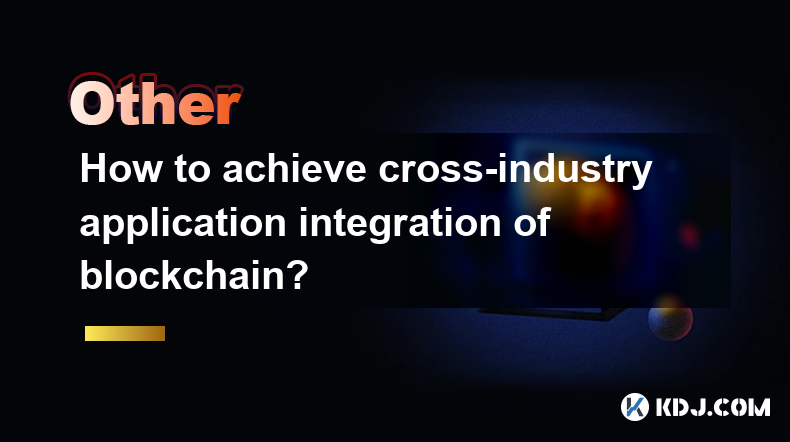
The integration of blockchain technology across various industries presents a transformative opportunity to enhance efficiency, security, and transparency. Blockchain, at its core, is a distributed ledger technology that records transactions across numerous computers, ensuring that the data is immutable and verifiable. To achieve cross-industry application integration of blockchain, it is essential to understand the technology's potential and the steps required to implement it effectively.
Understanding Blockchain's Potential Across Industries
Blockchain technology has the potential to revolutionize numerous sectors by providing a secure and transparent method for recording transactions and data. In the financial sector, blockchain can streamline processes like cross-border payments and trade finance. In healthcare, it can secure patient records and ensure the integrity of medical data. Supply chain management can benefit from blockchain by tracking the provenance of goods from manufacturer to consumer. Each industry faces unique challenges, but the underlying principles of blockchain can be adapted to meet these diverse needs.
Identifying Key Use Cases for Blockchain Integration
To integrate blockchain across industries, it is crucial to identify specific use cases where the technology can add value. For instance, in the financial industry, blockchain can be used for smart contracts that automatically execute agreements when certain conditions are met. In healthcare, blockchain can facilitate the secure sharing of patient data among different healthcare providers. In supply chain management, blockchain can provide a tamper-proof record of the journey of goods, ensuring authenticity and reducing fraud. By pinpointing these use cases, industries can begin to develop tailored blockchain solutions.
Developing a Blockchain Integration Strategy
Developing a strategy for blockchain integration involves several key steps. First, assess the current infrastructure to determine how blockchain can be integrated without disrupting existing systems. Next, select the appropriate blockchain platform based on the specific needs of the industry. For example, public blockchains like Ethereum are suitable for applications requiring transparency, while private blockchains may be better for industries needing more control over data access. Then, develop a pilot project to test the blockchain solution in a controlled environment. Finally, scale the solution across the industry once the pilot proves successful.
Overcoming Technical and Regulatory Challenges
Integrating blockchain across industries is not without challenges. Technical hurdles include scalability, interoperability, and the need for standardization. Scalability refers to the ability of the blockchain to handle a large number of transactions efficiently. Interoperability is crucial for different blockchain systems to communicate with each other. Standardization ensures that blockchain solutions can be adopted universally across industries. Additionally, regulatory challenges must be addressed, as different countries have varying laws regarding data privacy and financial transactions. Collaborating with regulatory bodies and industry stakeholders can help navigate these challenges.
Building a Collaborative Ecosystem
To successfully integrate blockchain across industries, it is essential to build a collaborative ecosystem. This involves partnering with technology providers who have expertise in blockchain development. It also requires engaging with industry consortia that are working on blockchain standards and best practices. By fostering collaboration, industries can share knowledge, resources, and best practices, accelerating the adoption of blockchain technology. Additionally, educating stakeholders about the benefits and potential of blockchain is crucial to gaining buy-in and support for integration efforts.
Implementing Blockchain Solutions
Implementing blockchain solutions across industries involves several practical steps:
- Conduct a feasibility study to determine if blockchain is the right solution for the identified use case. This study should evaluate the potential benefits, costs, and risks associated with blockchain integration.
- Choose the right blockchain platform based on the specific requirements of the industry. Consider factors such as scalability, security, and ease of integration with existing systems.
- Develop the blockchain application using the chosen platform. This may involve hiring blockchain developers or partnering with a blockchain development company.
- Test the application in a controlled environment to ensure it meets the required standards for performance, security, and usability.
- Integrate the blockchain solution with existing systems. This may require developing APIs or other interfaces to ensure seamless data flow between the blockchain and legacy systems.
- Train staff on how to use the new blockchain solution. This is crucial for ensuring that the technology is adopted effectively and that users understand its benefits and limitations.
- Monitor and evaluate the performance of the blockchain solution. Collect data on its impact on efficiency, security, and transparency, and use this data to make any necessary adjustments.
Ensuring Security and Privacy
Security and privacy are paramount when integrating blockchain across industries. Blockchain's inherent security features, such as encryption and decentralization, provide a strong foundation for protecting data. However, additional measures must be taken to ensure that sensitive information is not compromised. This includes implementing access controls to restrict who can view or modify data on the blockchain. It also involves regular security audits to identify and address any vulnerabilities. In industries like healthcare, where patient privacy is critical, compliance with regulations such as HIPAA in the United States is essential.
Measuring the Impact of Blockchain Integration
To gauge the success of blockchain integration across industries, it is important to establish key performance indicators (KPIs). These KPIs should measure the impact of blockchain on efficiency, cost savings, security, and transparency. For example, in the financial industry, KPIs might include the time taken to process transactions, the cost of transaction processing, and the number of fraudulent transactions detected. In healthcare, KPIs could focus on the accuracy of patient records, the speed of data sharing among providers, and the level of patient satisfaction with data privacy. By regularly monitoring these KPIs, industries can assess the effectiveness of their blockchain solutions and make data-driven decisions for further improvements.
Frequently Asked Questions
Q: How can blockchain integration benefit small businesses?
A: Blockchain integration can benefit small businesses by providing access to secure and transparent transaction systems, reducing the cost of intermediaries, and enabling them to participate in global supply chains more effectively. For example, a small business can use blockchain to track the provenance of its products, ensuring authenticity and building trust with customers.
Q: What are the main barriers to blockchain adoption across industries?
A: The main barriers to blockchain adoption include technical challenges such as scalability and interoperability, regulatory uncertainty, and a lack of understanding about the technology among stakeholders. Overcoming these barriers requires collaboration between industry players, technology providers, and regulatory bodies.
Q: How can industries ensure the interoperability of different blockchain systems?
A: Ensuring interoperability between different blockchain systems involves developing standards and protocols that allow these systems to communicate effectively. Industry consortia and standards organizations play a crucial role in this process by working on common frameworks and APIs that enable seamless data exchange between different blockchain platforms.
Q: What role do smart contracts play in cross-industry blockchain integration?
A: Smart contracts are self-executing contracts with the terms directly written into code. They play a crucial role in cross-industry blockchain integration by automating processes and ensuring that agreements are executed transparently and efficiently. For example, in supply chain management, smart contracts can automatically trigger payments or release goods when certain conditions are met, reducing the need for intermediaries and increasing trust among parties.
Disclaimer:info@kdj.com
The information provided is not trading advice. kdj.com does not assume any responsibility for any investments made based on the information provided in this article. Cryptocurrencies are highly volatile and it is highly recommended that you invest with caution after thorough research!
If you believe that the content used on this website infringes your copyright, please contact us immediately (info@kdj.com) and we will delete it promptly.
- A Bitcoin Policy Institute (BPI) executive floated a $1 million Bitcoin price scenario if the United States were to buy 1 million BTC.
- 2025-04-16 21:35:15
- Oklahoma Exits the Race to Establish a Strategic Bitcoin Reserve (SBR) After Key Bill Fails
- 2025-04-16 21:35:15
- Bitcoin (BTC) could surge to $180,000 in the second half of 2025, analyst says
- 2025-04-16 21:35:13
- China Has Its Sights Set On Dumping Its Confiscated Bitcoin
- 2025-04-16 21:35:13
- ONDO or Ripple (XRP): In Which Should You Invest $10,000
- 2025-04-16 21:25:14
- Galaxy Digital Moves 25,000 ETH to Binance
- 2025-04-16 21:25:14
Related knowledge

Can the application of blockchain in supply chain finance bring benefits?
Apr 15,2025 at 04:00pm
Can the application of blockchain in supply chain finance bring benefits? The integration of blockchain technology into supply chain finance has garnered significant attention in the cryptocurrency and financial sectors. This article explores how blockchain can potentially revolutionize supply chain finance, detailing its benefits and providing a compre...

Does the ranking of Chinese blockchain apps include cross-chain applications?
Apr 14,2025 at 04:00pm
The ranking of Chinese blockchain apps is a comprehensive evaluation that takes into account various aspects such as user base, transaction volume, and technological innovation. A pertinent question arises regarding whether these rankings include cross-chain applications. Cross-chain applications, which allow different blockchain networks to interact an...
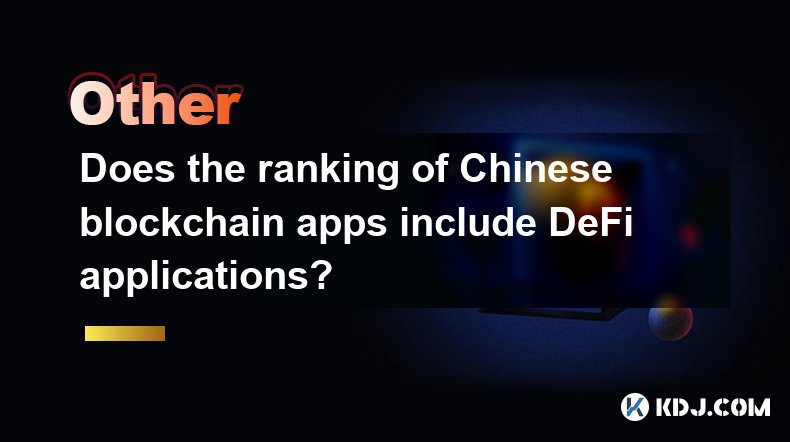
Does the ranking of Chinese blockchain apps include DeFi applications?
Apr 15,2025 at 06:57am
The ranking of Chinese blockchain apps is a comprehensive list that showcases the most popular and influential applications within the cryptocurrency ecosystem. One question that often arises is whether these rankings include DeFi applications. To answer this, we need to delve into the specifics of how these rankings are compiled and what types of appli...
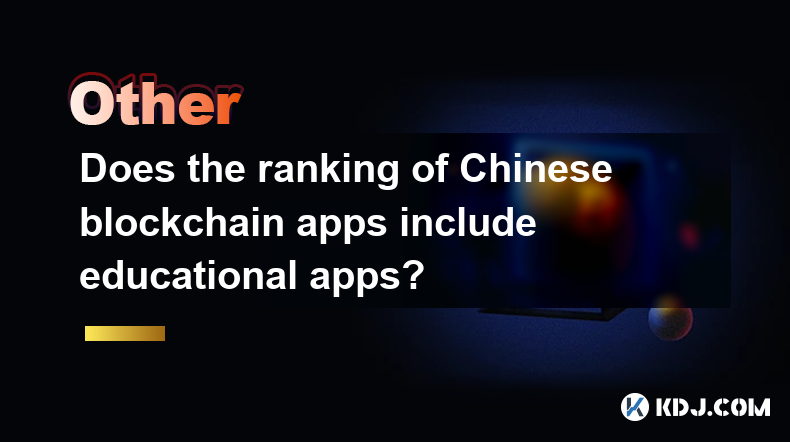
Does the ranking of Chinese blockchain apps include educational apps?
Apr 16,2025 at 03:35am
The ranking of Chinese blockchain apps often includes a variety of categories, from finance and gaming to social networking and beyond. One question that frequently arises is whether these rankings include educational apps. To address this, we need to delve into the specifics of how blockchain apps are categorized and ranked in China, and whether educat...
Does the ranking of Chinese blockchain apps include enterprise-level applications?
Apr 15,2025 at 06:42am
The ranking of Chinese blockchain apps often includes a variety of applications, ranging from consumer-focused to enterprise-level solutions. Understanding the scope and criteria for these rankings is essential to determine if enterprise-level applications are included. This article delves into the specifics of how Chinese blockchain app rankings are co...
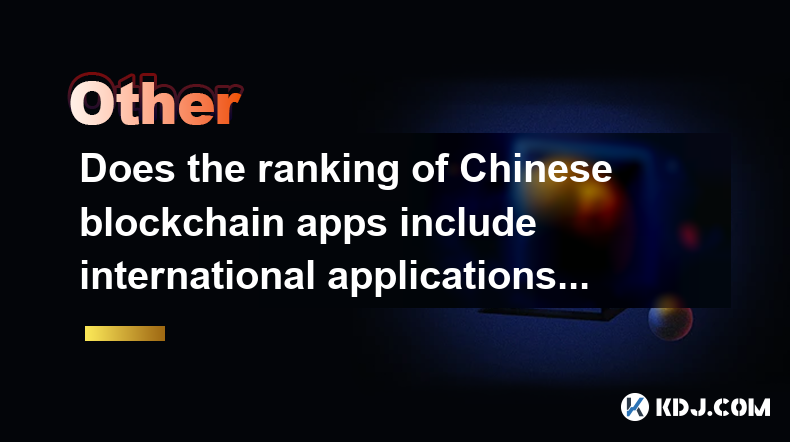
Does the ranking of Chinese blockchain apps include international applications?
Apr 16,2025 at 04:07am
The ranking of Chinese blockchain apps primarily focuses on applications developed and predominantly used within China. However, the question of whether these rankings include international applications is an intriguing one that warrants a detailed exploration. In this article, we will delve into the criteria used for ranking Chinese blockchain apps, th...

Can the application of blockchain in supply chain finance bring benefits?
Apr 15,2025 at 04:00pm
Can the application of blockchain in supply chain finance bring benefits? The integration of blockchain technology into supply chain finance has garnered significant attention in the cryptocurrency and financial sectors. This article explores how blockchain can potentially revolutionize supply chain finance, detailing its benefits and providing a compre...

Does the ranking of Chinese blockchain apps include cross-chain applications?
Apr 14,2025 at 04:00pm
The ranking of Chinese blockchain apps is a comprehensive evaluation that takes into account various aspects such as user base, transaction volume, and technological innovation. A pertinent question arises regarding whether these rankings include cross-chain applications. Cross-chain applications, which allow different blockchain networks to interact an...

Does the ranking of Chinese blockchain apps include DeFi applications?
Apr 15,2025 at 06:57am
The ranking of Chinese blockchain apps is a comprehensive list that showcases the most popular and influential applications within the cryptocurrency ecosystem. One question that often arises is whether these rankings include DeFi applications. To answer this, we need to delve into the specifics of how these rankings are compiled and what types of appli...

Does the ranking of Chinese blockchain apps include educational apps?
Apr 16,2025 at 03:35am
The ranking of Chinese blockchain apps often includes a variety of categories, from finance and gaming to social networking and beyond. One question that frequently arises is whether these rankings include educational apps. To address this, we need to delve into the specifics of how blockchain apps are categorized and ranked in China, and whether educat...

Does the ranking of Chinese blockchain apps include enterprise-level applications?
Apr 15,2025 at 06:42am
The ranking of Chinese blockchain apps often includes a variety of applications, ranging from consumer-focused to enterprise-level solutions. Understanding the scope and criteria for these rankings is essential to determine if enterprise-level applications are included. This article delves into the specifics of how Chinese blockchain app rankings are co...

Does the ranking of Chinese blockchain apps include international applications?
Apr 16,2025 at 04:07am
The ranking of Chinese blockchain apps primarily focuses on applications developed and predominantly used within China. However, the question of whether these rankings include international applications is an intriguing one that warrants a detailed exploration. In this article, we will delve into the criteria used for ranking Chinese blockchain apps, th...
See all articles























































































